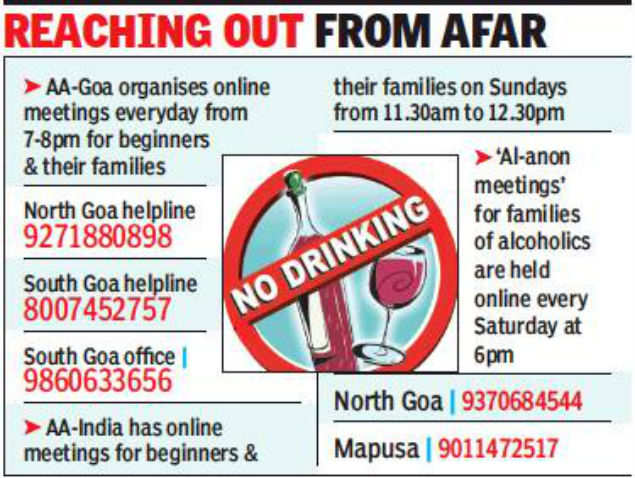
PANAJI: “Hi. I am Anthony and I am an alcoholic. I haven’t had a drink today,” says the first member at an Alcoholics Anonymous (AA) meeting. The other 20-odd members welcome him, kicking off the one-hour meeting that has moved online during Covid-19 times.
The shift to the virtual world appears to have benefitted many alcoholics and their families who have been able to learn about the disease by joining in anonymously, without compromising on their social status.

“They put in a name, mute their microphones and listen in. They get information about why people take to alcohol and identify with them. They don’t have to actively share and nobody asks them any questions. It’s a free fellowship right from one’s home,” chairman of the North Goa intergroup, George, says.

The older, less tech-savvy members, however, continue to support one another via phone calls.
Goa has 67 AA groups of which 50 are in South Goa. Prior to the lockdown, face-to-face meetings were regularly held in schools, church halls and at primary health care centres.
A recent online meeting that revolved around the theme of ‘false pride’, gave members an opportunity to share experiences of having failed when they relied solely on themselves and their willpower to quit.
Ralph, one of the younger members who is in his early twenties, was happy to tell the others that he had been clean for 65 days. Addicted to both alcohol and drugs, he was brought up by a maid after his parents split. By the age of 17, he had landed in rehab.
“After my relapse, I’ve accepted that I can’t control myself. I’ve squandered my parents’ money. I’m fed up of it and want to stop,” he told the other members during the meeting.
In fact, compared to pure alcoholics who would reach out to AA Goa a decade or two ago, several of the younger members are dual addicts like Ralph — addicted to both, alcohol and drugs. “We find that the newcomers started early and are also seeking help early. They only lack patience to stick around. It’s much easier for them to get in and out of the group when it’s online,” George says.
Easy accessibility to online meetings has also prompted those in need to attend as many as they can. Paul, a member, said he tries to attend meetings in the mornings and evenings too, as he is always dependent on the group to remain sober. “It is the only ray of hope for me. Whenever I feel like taking a drink, I call up an AA member,” he says.
For Jude, who has been sober for over a decade now, the virtual meetings prevent him from convincing himself that he requires a drink. He admits that although he is an adult, he has the emotional maturity of a 14-year-old and only needs a simple excuse to forget all that he has gone through and get back to his old ways.
Women continue to be closet drinkers, with very few logging into the meetings online. “It was difficult for women to attend AA meetings in the past as members were predominantly male and it was difficult to identify with their experiences. For women, alcoholism is a problem that is yet to be addressed. Somehow, society says it’s OK for a man to be an alcoholic,” an AA member says.
Whether online or offline, group therapy has proved effective in helping alcoholics stay away from the bottle when they listen to the experiences of others. They are also encouraged by those who have changed and are living purposeful lives today.
“The biggest misconception is that alcoholism is a habit and that one can stop any time. Just like people with illnesses like cancer, an alcoholic too needs understanding and compassion. Everyone consumes sugar but only some will develop diabetes. It’s the same with alcohol,” George says.
The shift to the virtual world appears to have benefitted many alcoholics and their families who have been able to learn about the disease by joining in anonymously, without compromising on their social status.

“They put in a name, mute their microphones and listen in. They get information about why people take to alcohol and identify with them. They don’t have to actively share and nobody asks them any questions. It’s a free fellowship right from one’s home,” chairman of the North Goa intergroup, George, says.

The older, less tech-savvy members, however, continue to support one another via phone calls.
Goa has 67 AA groups of which 50 are in South Goa. Prior to the lockdown, face-to-face meetings were regularly held in schools, church halls and at primary health care centres.
A recent online meeting that revolved around the theme of ‘false pride’, gave members an opportunity to share experiences of having failed when they relied solely on themselves and their willpower to quit.
Ralph, one of the younger members who is in his early twenties, was happy to tell the others that he had been clean for 65 days. Addicted to both alcohol and drugs, he was brought up by a maid after his parents split. By the age of 17, he had landed in rehab.
“After my relapse, I’ve accepted that I can’t control myself. I’ve squandered my parents’ money. I’m fed up of it and want to stop,” he told the other members during the meeting.
In fact, compared to pure alcoholics who would reach out to AA Goa a decade or two ago, several of the younger members are dual addicts like Ralph — addicted to both, alcohol and drugs. “We find that the newcomers started early and are also seeking help early. They only lack patience to stick around. It’s much easier for them to get in and out of the group when it’s online,” George says.
Easy accessibility to online meetings has also prompted those in need to attend as many as they can. Paul, a member, said he tries to attend meetings in the mornings and evenings too, as he is always dependent on the group to remain sober. “It is the only ray of hope for me. Whenever I feel like taking a drink, I call up an AA member,” he says.
For Jude, who has been sober for over a decade now, the virtual meetings prevent him from convincing himself that he requires a drink. He admits that although he is an adult, he has the emotional maturity of a 14-year-old and only needs a simple excuse to forget all that he has gone through and get back to his old ways.
Women continue to be closet drinkers, with very few logging into the meetings online. “It was difficult for women to attend AA meetings in the past as members were predominantly male and it was difficult to identify with their experiences. For women, alcoholism is a problem that is yet to be addressed. Somehow, society says it’s OK for a man to be an alcoholic,” an AA member says.
Whether online or offline, group therapy has proved effective in helping alcoholics stay away from the bottle when they listen to the experiences of others. They are also encouraged by those who have changed and are living purposeful lives today.
“The biggest misconception is that alcoholism is a habit and that one can stop any time. Just like people with illnesses like cancer, an alcoholic too needs understanding and compassion. Everyone consumes sugar but only some will develop diabetes. It’s the same with alcohol,” George says.
Quick Links
Kerala Coronavirus Helpline NumberHaryana Coronavirus Helpline NumberUP Coronavirus Helpline NumberBareilly NewsBhopal NewsCoronavirus in DelhiCoronavirus in HyderabadCoronavirus in IndiaCoronavirus symptomsCoronavirusRajasthan Coronavirus Helpline NumberAditya ThackerayShiv SenaFire in MumbaiAP Coronavirus Helpline NumberArvind KejriwalJammu Kashmir Coronavirus Helpline NumberSrinagar encounter
Get the app








